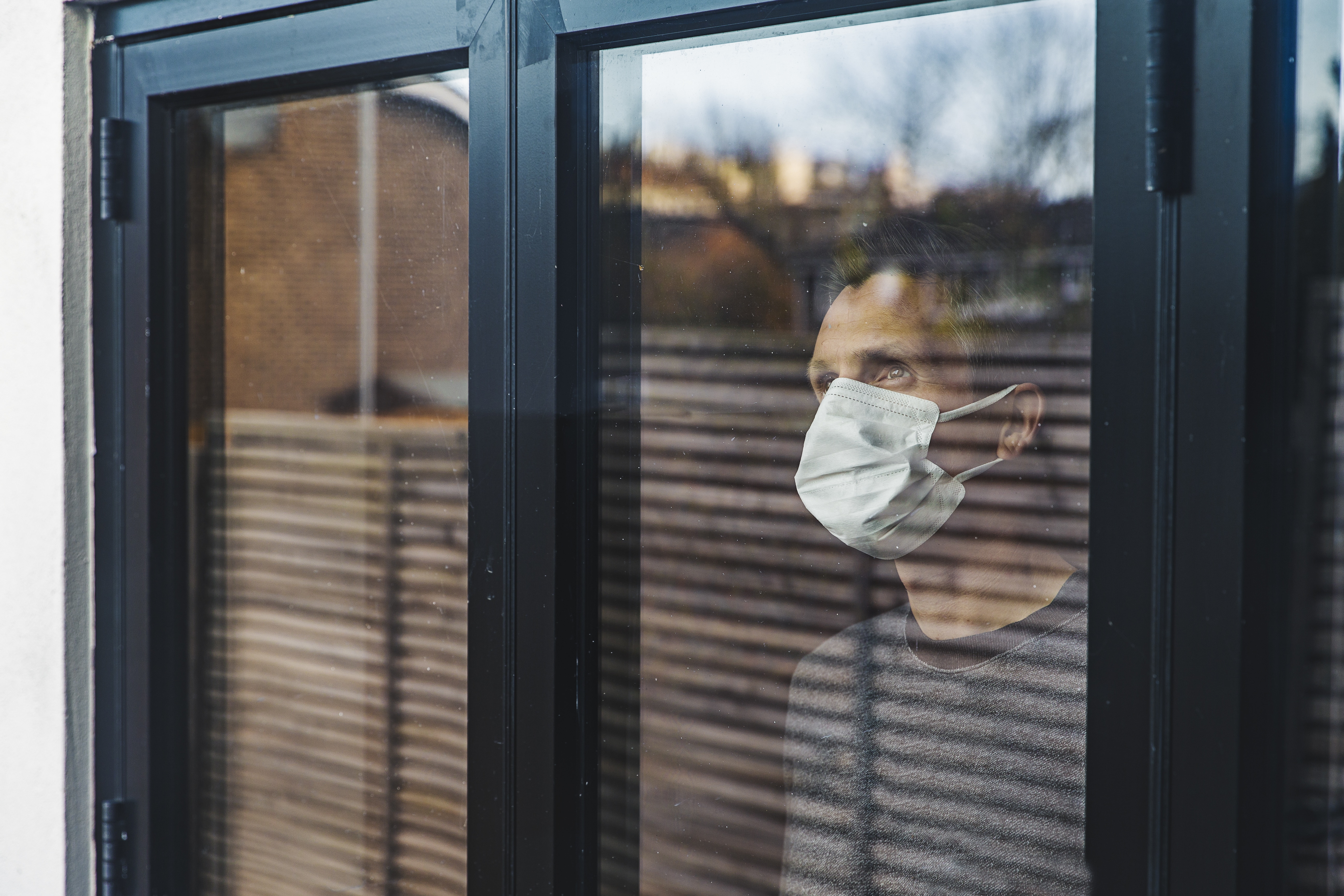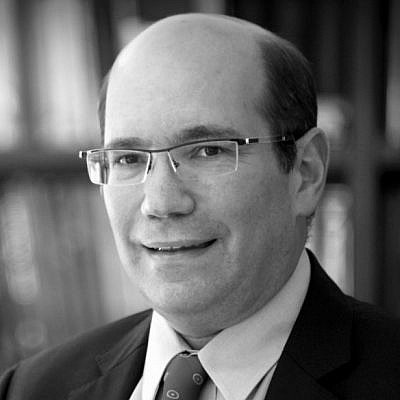 Man self isolating at home; Photo by Getty Images.
Man self isolating at home; Photo by Getty Images. Although I’m a traditional person, I have never been much for praying. I usually attend services armed with a nonfiction book. Books make sense to me: they inform, change, enlighten, surprise and inspire. Prayer books always struck me as the spiritual equivalent of laundry instructions: rinse, wash, repeat — laden with time-consuming obscure rituals and words. Recently, forced by the double-whammy of mourning my mother’s death during a ritualized seven days of shivah followed by two weeks of coronavirus quarantine, I started appreciating prayers —and the books that contain them.
Accepting the obligation to mark my mother’s memory by saying Kaddish in the three daily services for the next 11 months, I’ve been praying regularly since my 86-year-old mother Elaine Troy died on March 3. Addicted to community-building, Judaism demands you say the prayer in a minyan (a quorum of 10), which I did 21 times during the first seven days. Quarantine forced me to pray privately.
Within a week, I discovered something unexpected. The prayers connected me with my people, not just God. Even in isolation I was never alone.
My more devout children informed me that before praying, Jews ritually wash their hands. There’s no better ritual during a pandemic. After reciting the hand washing blessing while walking from the kitchen to the living room, I sneak in the prayer I should have said upon rising — Modeh Ani — thanking God for restoring my soul for yet another day. While sidestepping questions about God’s essence, I appreciate waking with an appreciation. It gets me tallying all the good in our lives, even while mourning my mother — and so many others — in lockdown.
Now it gets weird. I wrap myself in a tallit. That’s pretty standard American Jewish fare. Then I go medieval. I take tefillin (phylacteries) — the two small square leather boxes filled with Torah clippings, and affix them to my forearm and forehead with leather straps. I never understood this ritual – and fumble like a bar mitzvah boy trying to stabilize my arm box, without cutting off my circulation. The Hebrew word tefillin comes from prayer — tefillah. The English word comes from the Greek, protectant. The verses inside say: wearing these reminds us of our liberation… from slavery.
This, I can handle as a history professor. I’m girding myself for spiritual battle as a supplicant, wearing “armor” at a time when our bodies are especially vulnerable yet also threatening to others. And I’m wearing a uniform, preparing for time travel, remembering the Exodus from Egypt 3400 years ago. Evoking that story opens the floodgate of Jewish memories and values from our debut as a people, celebrating freedom and inspiring us to persist.

I’ve been up for 15 minutes. I’ve been praying for three, and my mind is already racing, my newly restored soul already soaring. Now, the next ritual I never understood: the Orthodox worshiper’s mumbling marathon. Especially alone, I realize it’s the only way to avoid cheating with supersonic speed-reading. Saying each word engages you, transforming prayer from a passive show to a thought-provoking act.
The script to follow offers a library’s worth of ideas, inspirations, challenges, morals — to set your daily agenda. When writing, I imagine words as keys to open minds or spotlights to illuminate insights. When debating, words become guided missiles, targeting my opponents’ weakest points. I envision these words as thank you notes, historical post-its, ethical strings around my finger and petitions for peace, health, justice, sanity. Then, on Mondays and Thursdays, in the long tachanun (supplication) service, a plea: “Do not abandon us. O Lord… for we are worn out by the sword and captivity, pestilence and plague.” Bingo. Suddenly, we’re both current and cosmic, reassured that we’ve survived worse.
On different days different phrases pop out. I enjoy bumping into Moses, King David, Isaiah and Maimonides regularly. I like the shema’s proud particularism —“Hear O Israel” — balanced with a universalist high five to all monotheists – “the Lord is one.” I respect the challenge to accept communal responsibility and avoid national arrogance in MiPnei Chataynu – “we were exiled because of our sins” and the admonition to avoid gossip and think the best of people at the end of the Amidah, the standing prayer: “keep my tongue and lips from lying.”
Rather than feeling repetitive, the prayer book feels like a menu brimming with traditional favorites and new delicacies. As in any restaurant, some dishes aren’t to my taste. My friends who are Editorial Jews zero in on the one thing they dislike to justify rejecting it all. Instead, I marvel at how much resonates after all these centuries, while navigating around the occasional potholes.
Every morning, as we start, I stumble on the male’s Dawn prayer — “thanks for not making me a woman” — which liberal Jews render as “thanks for making me as You wished.” I dodge the discomfort by speculating about who would want a prayer affirming gender identity and who would want one affirming God’s will.
As each of the three daily services end, I read but pointedly don’t say in the Aleinu – “we are obliged” – prayer: “For they worship vanity and emptiness, and pray to a god who cannot save.” I like that the Orthodox have not eliminated that line. It candidly acknowledges Jews’ traumatic persecution-scarred history; but I love skipping the line, because today, many who were once “they” and “hostile” are now our friends.
The siddur (prayer book) means order. I quickly adjusted to the structure, the ritualized repetition, as an aid not an impediment. It’s why (when not locked down) I jog every morning along the same path. When freed from reinventing basics, your mind can leap further ahead.
The morning service ends particularly nicely for these days. Reciting a different psalm of the day each day, while building up to the Sabbath, restores my sense of time amid the chronological blur of virtual house arrest.
During what ended up being my mother’s last hours, when terminal restlessness had her tossing fitfully, yet too exhausted to speak full sentences, I recited the traditional Jewish vidui confessional with her – Shema Yisrael — affirming God’s oneness.
During what ended up being my mother’s last hours, when terminal restlessness had her tossing fitfully, yet too exhausted to speak full sentences, I recited the traditional Jewish vidui confessional with her – Shema Yisrael — affirming God’s oneness. Still agitated, she conveyed somehow that she wanted different songs. When I sang the Zionist folk songs of her youth, ending with Hatikvah, she relaxed.
Her finale reinforced two of her life lessons. She was never arrogant enough to claim that the Jewish way is the best way, but she believed in finding a way, an identity, in being a “something,” warning, “don’t be so open-minded your brains fall out.” And she deployed prayers, songs, rituals and memories as conveyor belts of good values, spurs toward living ethically, purposefully. At that profound moment, as her life ebbed away, she, a born teacher, demonstrated the power of having tunes, ideas and values, drilled into you in childhood, and how they comfort us when the unknown looms.

Eventually I found a Zoom minyan – which is another story – but the praying alone while so lost and alone served as good basic training for this dramatic life change. I’m now befriending my prayer book. I am embracing it as historical monograph, philosophical treatise, ethical guide, Judaism primer, songster, self-help book. Even the prospect of 1053 praying sessions – or thrice daily as long as I live – now seems manageable.
Perhaps, I am grasping at straws. Forced indoors, facing great uncertainty globally amid this 11-month personal commitment, I may just be trying to make the best of it. But that too is what my wise mother taught me to do. Unhappy people feel oppressed by whatever life sends us. Others try returning the serve no matter how challenging it may be, turning it into a win or at least a meaningful volley.
So now, every morning, after 32 minutes, as I unwrap, fold up, put away and plan for afternoon prayers, I’ve been rooted, challenged, inspired. Spiritual engagement dulled the pain of social estrangement. I’ve crossed the Red Sea, accepted the Ten Commandments at Sinai, danced at the Holy Temple, survived medieval and Nazi persecutions, sampled the Talmud, returned to Zion, been energized by the past, oriented in the present and charged up for the future.
Along the way, I dedicated time to honoring my mother’s legacy, even without that quorum. I also remembered that, thanks to her and my father, I can sally forth confidently, knowing that wherever I am, whatever I face, no matter how isolated I might appear to be, I am never alone — or adrift —always connected to my past, my tradition, my people and soul-stretching ideals.
Professor Gil Troy is a Distinguished Scholar of North American History at McGill University and the author of 10 books on the American presidency. In September, PublicAffairs of Hachette will publish his next book, co-authored with Natan Sharansky, “Never Alone: Prison, Politics, and My People.”























 More news and opinions than at a Shabbat dinner, right in your inbox.
More news and opinions than at a Shabbat dinner, right in your inbox.